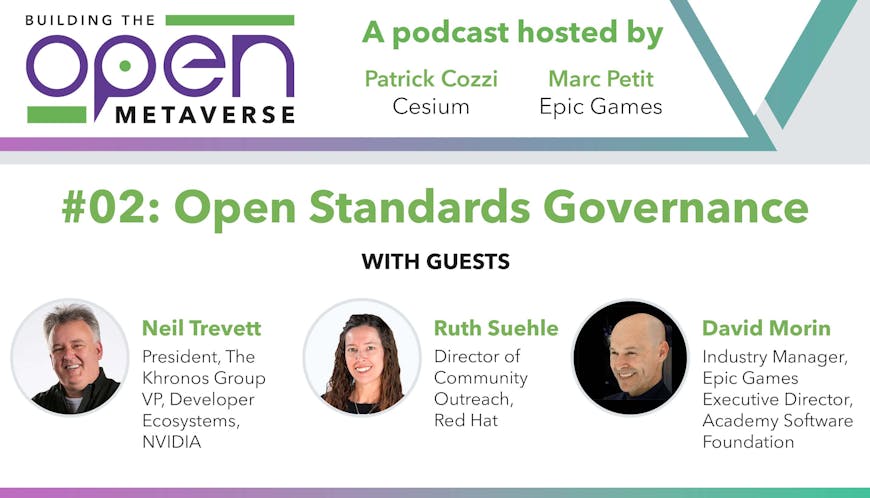Building the Open Metaverse: Open Standards Governance
In the second episode of Building the Open Metaverse, Cesium CEO Patrick Cozzi and Marc Petit, VP and General Manager of Unreal Engine at Epic Games, discuss how open standards will enable the metaverse.
They were joined by three guests with expertise in open source and open standards:
Neil Trevett, the Vice President of Developer Ecosystems at NVIDIA, is also President of The Khronos Group, which develops graphics standards including WebGL, glTF, Vulkan, OpenGL ES, and OpenXR.
David Morin is Industry Manager at Epic Games and the Executive Director of the Academy Software Foundation, which has worked to turn formats in the film industry such as OpenVDB into open standards.
Ruth Suehle is the Director of Community Outreach at Red Hat and the Executive Vice-President of the Apache Software Foundation—their Apache 2.0 license is the open source license that accompanies CesiumJS.

The group discussed open source software and open standards, how they’re created and maintained, and how they enable interoperability and healthy competition.
Ruth used familiar examples to demonstrate how critical open standards are to allowing interoperability between different types of hardware and software: “Do you like that you can work on the WiFi at the coffee shop and your office and your house without a problem? You need WiFi standards. … Do you like being able to open files that you created 20 years ago? Or in contrast, if you've ever gotten frustrated because you wanted to open something and that software doesn't exist anymore, nothing else opens it? There you go. You've met the world of open standards. Or lack thereof.”
As critical as open standards are to the state of computing as we know it, everyone agreed that they’ll be even more important in developing the metaverse. “When we think of the metaverse as a future internet that has 3D immersion at its center,” Patrick said, “We will need a lot of 3D interoperability, especially to have a fully simulated world.”
“glTF is a very interesting project because it's not trying to be at the cutting edge of technology, but it's definitely at the cutting edge of global deployment” - Neil Trevett
We’ll also need assets that can move freely between worlds. As Marc explained, that will require standards that are much more far reaching than those already developed. Whereas today’s open standards allow interoperability between vendors in a single industry—for example, any film studio can create explosions with OpenVDB—the metaverse will require interoperability across industries—for example, a car model that could be reused at the worldwide distribution level.
Neil said, “if we're going to have genuinely composable reusable metaverse assets that'll go beyond just the textures and the polygons, and they start having things like behaviors and physics, price, the whole economics, the DRM, all these different things that you're going to need to be able to take an asset in all its complexity, between these different parts of the metaverse. Now that's going to be a very interesting interoperability challenge.”
Developing such standards is going to require immense collaboration, Patrick asserted: “We need to come together to build open standards as a community. But the communities building open standards also need to come together to serve the full market needs.” That’s something, Marc said, that will require active, thoughtful effort, because unlike the open standards that built the Internet, which were government funded and mandated, these standards will need to be built collectively without that same mandate.
Listen to the full episode and subscribe for future discussions about building the metaverse.